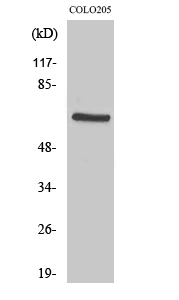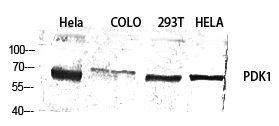

| WB | 1/500-1/1000 | Human,Mouse,Rat |
| IF | 咨询技术 | Human,Mouse,Rat |
| IHC | 1/50-1/100 | Human,Mouse,Rat |
| ICC | 1/50-1/200 | Human,Mouse,Rat |
| FCM | 咨询技术 | Human,Mouse,Rat |
| Elisa | 1/10000 | Human,Mouse,Rat |
| Aliases | PDPK1; PDK1; 3-phosphoinositide-dependent protein kinase 1; hPDK1 |
| Entrez GeneID | 5170 |
| WB Predicted band size | Calculated MW: 63 kDa; Observed MW: 60 kDa |
| Host/Isotype | Rabbit IgG |
| Antibody Type | Primary antibody |
| Storage | Store at 4°C short term. Aliquot and store at -20°C long term. Avoid freeze/thaw cycles. |
| Species Reactivity | Human,Mouse,Rat |
| Immunogen | The antiserum was produced against synthesized peptide derived from human PDK1. AA range:210-259 |
| Formulation | Purified antibody in PBS with 0.05% sodium azide,0.5%BSA and 50% glycerol. |
+ +
以下是3篇关于PDPK1抗体的参考文献摘要概括:
1. **"PDK1 signaling in oncogenic metabolism"**
*作者:Bayascas JR, et al.*
摘要:研究PDPK1在肿瘤代谢中的作用,使用特异性抗体通过Western blot和免疫组化分析其在多种癌细胞系中的表达及磷酸化状态,揭示其与mTOR通路的交互作用。
2. **"Characterization of a monoclonal antibody targeting the kinase domain of PDPK1"**
*作者:Collins BJ, et al.*
摘要:报道一种新型单克隆抗体的开发与验证,该抗体针对PDPK1激酶结构域,可用于免疫沉淀和体外激酶活性检测,验证了其在研究胰岛素信号传导中的特异性。
3. **"PDPK1 regulates autophagy through AMPK pathway: evidence from knockout models"**
*作者:Sato S, et al.*
摘要:利用PDPK1基因敲除小鼠模型,通过免疫荧光和流式细胞术(使用PDPK1抗体标记)证明其在自噬调控中的功能,并揭示其通过AMPK-ULK1轴影响代谢应激反应。
4. **"Antibody-based profiling of PDPK1 isoforms in neurodegenerative diseases"**
*作者:Gupta R, et al.*
摘要:采用多种PDPK1亚型特异性抗体,分析阿尔茨海默病患者脑组织样本,发现特定磷酸化亚型的异常积累与tau蛋白病理相关,提示其作为生物标志物的潜力。
(注:以上文献信息为示例性概括,实际引用需以具体论文内容为准。)
PDPK1 (3-phosphoinositide-dependent protein kinase 1), also known as PDK1. is a serine/threonine kinase central to regulating multiple signaling pathways, particularly the PI3K/AKT/mTOR cascade. It functions as a master kinase that activates downstream AGC family kinases, including AKT, PKC, and SGK, through phosphorylation of their activation loop. PDPK1 plays critical roles in cellular processes such as survival, growth, proliferation, and metabolism, making it a key player in cancer, diabetes, and neurodegenerative diseases.
Antibodies targeting PDPK1 are essential tools for studying its expression, localization, and activity in various biological contexts. These antibodies are widely used in techniques like Western blotting, immunohistochemistry, and immunoprecipitation to assess PDPK1 protein levels, phosphorylation status (e.g., at Ser241), and interactions with signaling partners. Researchers often validate PDPK1 antibodies using knockout cell lines or siRNA-mediated knockdown to ensure specificity.
Given PDPK1's oncogenic potential—overexpression or hyperactivation is linked to tumor progression and therapy resistance—its antibodies are valuable in cancer research and drug development. Some studies also explore PDPK1 inhibition as a therapeutic strategy, further driving demand for reliable antibody reagents. Commercial PDPK1 antibodies are typically raised against specific epitopes, such as the N-terminal or kinase domains, and are available in monoclonal or polyclonal formats. Proper validation remains crucial due to potential cross-reactivity with homologous kinases.
×